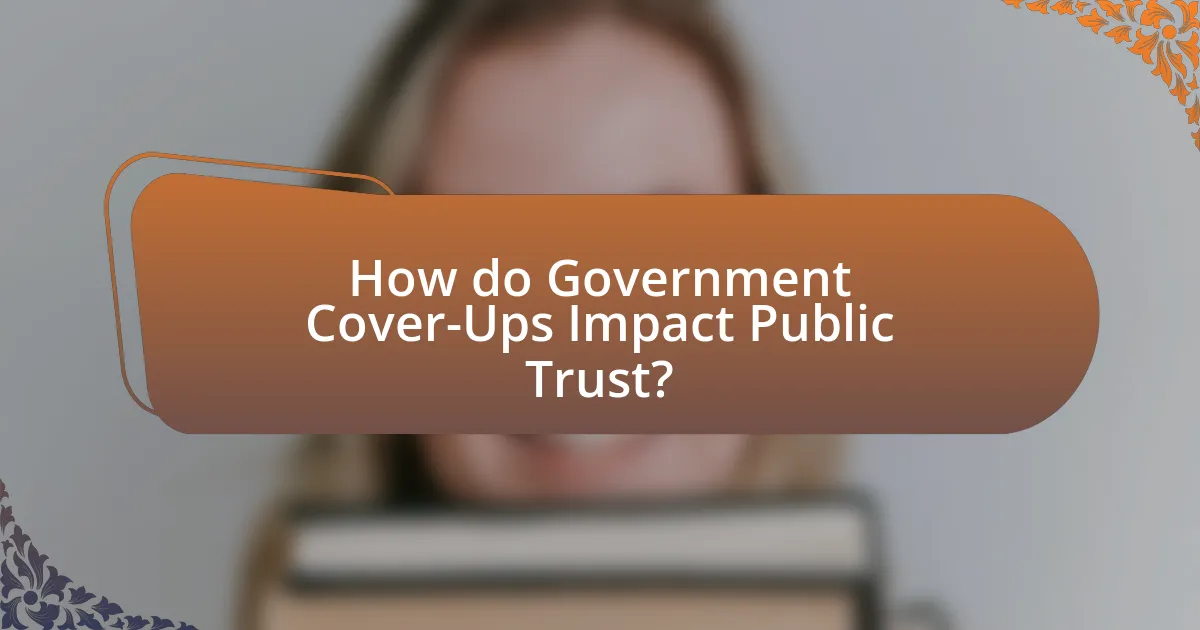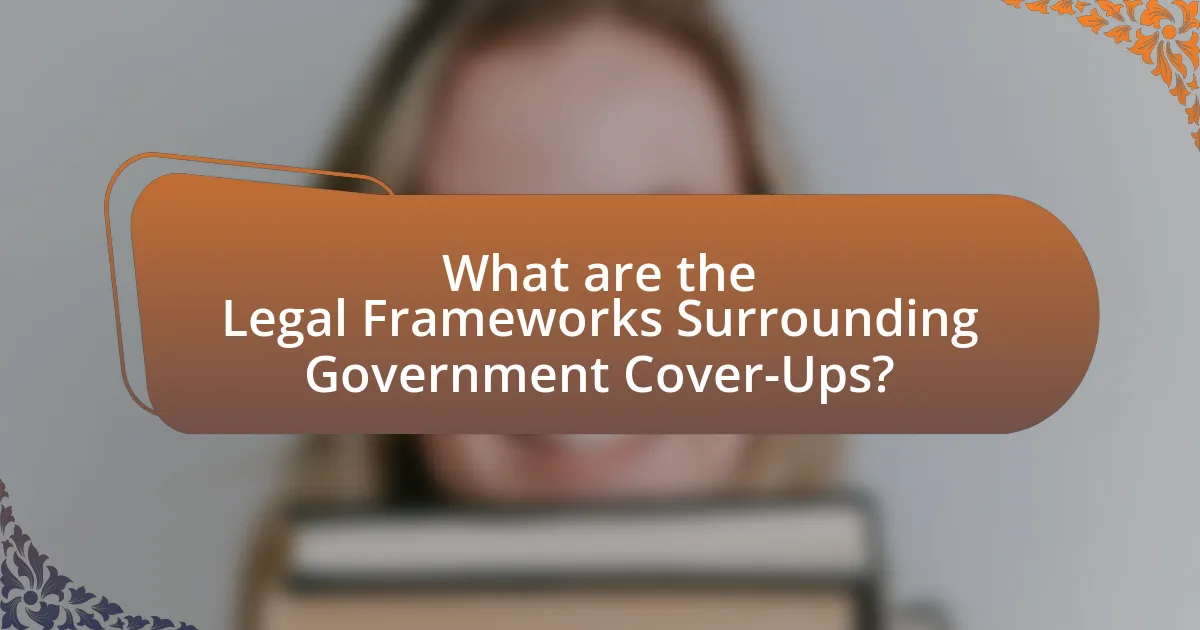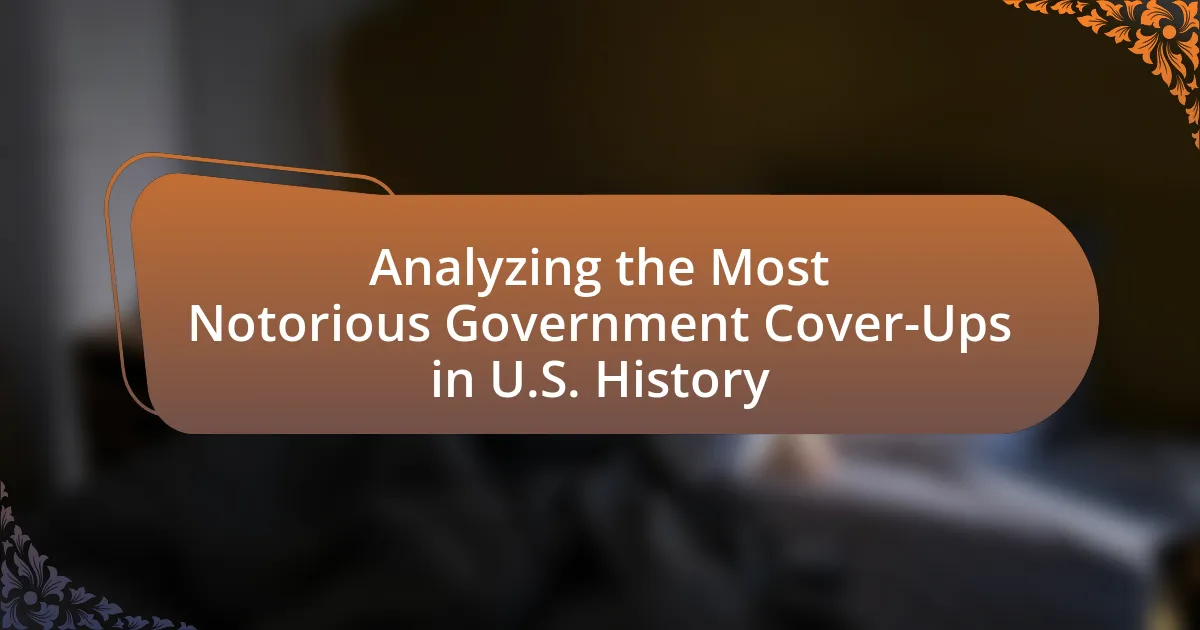The article analyzes the most notorious government cover-ups in U.S. history, focusing on significant events such as the Watergate scandal, the Tuskegee syphilis study, and the Iran-Contra affair. It explores the motivations behind these cover-ups, including the desire to protect national security and maintain political power, and discusses the implications for public trust in government institutions. Additionally, the article examines the role of media in exposing these cover-ups, the legal frameworks surrounding government transparency, and the actions citizens can take to promote accountability and transparency in government.

What are the Most Notorious Government Cover-Ups in U.S. History?
The most notorious government cover-ups in U.S. history include the Watergate scandal, the Tuskegee syphilis study, and the Iran-Contra affair. The Watergate scandal involved a break-in at the Democratic National Committee headquarters and subsequent attempts by the Nixon administration to cover it up, leading to President Nixon’s resignation in 1974. The Tuskegee syphilis study, conducted from 1932 to 1972, involved the unethical treatment of African American men who were misled about their health status and denied treatment for syphilis. The Iran-Contra affair, which occurred during the Reagan administration, involved the secret sale of arms to Iran to fund Contra rebels in Nicaragua, circumventing Congress’s prohibition on such funding. Each of these events is well-documented and has had significant implications for public trust in government.
Why do government cover-ups occur?
Government cover-ups occur primarily to protect national security, maintain political power, or prevent public panic. For instance, during the Watergate scandal, the Nixon administration attempted to conceal its involvement in illegal activities to preserve its authority and avoid political fallout. Historical examples, such as the Tuskegee Syphilis Study, illustrate how governments may suppress information to avoid accountability and protect their interests, often at the expense of public trust and ethical standards.
What motivations drive governments to conceal information?
Governments conceal information primarily to maintain power, control public perception, and protect national security. For instance, during the Watergate scandal, the Nixon administration sought to hide its involvement in illegal activities to preserve its political standing and avoid accountability. Additionally, governments may withhold information to prevent public panic or unrest, as seen in the handling of the COVID-19 pandemic, where initial data was sometimes downplayed to avoid widespread fear. These motivations are often rooted in the desire to manage the narrative and maintain stability, reflecting a broader pattern of behavior observed in various historical contexts.
How do political interests influence cover-ups?
Political interests significantly influence cover-ups by prioritizing the protection of power and reputation over transparency and accountability. For instance, during the Watergate scandal, political leaders sought to conceal their involvement in illegal activities to maintain their positions and avoid public backlash. This behavior illustrates how political entities may engage in cover-ups to safeguard their interests, often leading to a lack of trust in government institutions. Historical examples, such as the Iran-Contra affair, further demonstrate that political motivations can drive decisions to obscure facts, manipulate information, and ultimately evade scrutiny, thereby undermining democratic processes.
What are some historical examples of government cover-ups?
Some historical examples of government cover-ups include the Watergate scandal, the Tuskegee syphilis study, and the Iran-Contra affair. The Watergate scandal involved a break-in at the Democratic National Committee headquarters in 1972 and subsequent efforts by the Nixon administration to conceal its involvement, leading to President Nixon’s resignation in 1974. The Tuskegee syphilis study, conducted from 1932 to 1972, involved the unethical treatment of African American men who were misled about their health status and denied treatment for syphilis to study the disease’s progression. The Iran-Contra affair in the 1980s involved the secret sale of arms to Iran to fund Contra rebels in Nicaragua, circumventing Congress’s prohibition on such funding, which was later covered up by senior officials in the Reagan administration.
What was the Watergate scandal and its implications?
The Watergate scandal was a political scandal in the United States during the early 1970s, involving a break-in at the Democratic National Committee headquarters and the subsequent cover-up by members of the Nixon administration. The scandal led to the resignation of President Richard Nixon on August 8, 1974, making him the first U.S. president to resign from office. Its implications included a significant loss of trust in government institutions, the establishment of stricter campaign finance laws, and the strengthening of checks and balances within the U.S. political system, as evidenced by the passage of the Ethics in Government Act of 1978.
How did the Iran-Contra affair unfold?
The Iran-Contra affair unfolded through a covert operation initiated by the Reagan administration in the 1980s, involving the secret sale of arms to Iran, which was under an arms embargo, to fund Contra rebels in Nicaragua. This operation began in 1985 when U.S. officials sought to improve relations with Iran and simultaneously support the Contras, who were fighting the Sandinista government. The affair came to light in November 1986 when a Lebanese magazine reported the arms sales, leading to investigations by Congress and a special prosecutor. The scandal revealed significant violations of U.S. law, including the Boland Amendment, which prohibited aid to the Contras, and resulted in several indictments and convictions of key officials, although many were later pardoned.

How do Government Cover-Ups Impact Public Trust?
Government cover-ups significantly erode public trust by fostering skepticism and cynicism towards authorities. When citizens discover that their government has concealed information, such as in the Watergate scandal or the Tuskegee syphilis study, it leads to a perception of dishonesty and a lack of accountability. According to a 2019 Pew Research Center survey, 70% of Americans believe that government officials are not honest, a sentiment largely fueled by historical cover-ups that have been revealed over time. This erosion of trust can result in decreased civic engagement and increased polarization, as individuals become more likely to distrust not only the government but also the institutions that support it.
What are the consequences of government cover-ups on society?
Government cover-ups lead to a significant erosion of public trust in institutions. When citizens discover that their government has concealed information, it fosters skepticism and cynicism towards authority, which can result in decreased civic engagement and increased polarization within society. For instance, the Watergate scandal in the 1970s revealed extensive governmental deceit, leading to widespread disillusionment with political leaders and a decline in voter turnout. Additionally, cover-ups can hinder accountability, allowing unethical behavior to persist without consequence, as seen in the Tuskegee Syphilis Study, where the government misled participants for decades, resulting in long-lasting harm to the affected communities. Ultimately, these consequences can destabilize social cohesion and undermine democratic processes.
How do cover-ups affect citizen trust in government institutions?
Cover-ups significantly erode citizen trust in government institutions by fostering skepticism and cynicism among the public. When governments engage in deceptive practices, such as withholding information or manipulating facts, it creates a perception of dishonesty and lack of accountability. For instance, the Watergate scandal in the 1970s led to a dramatic decline in public trust in the U.S. government, with a Gallup poll showing that trust in government dropped from 77% in 1964 to just 36% by 1974. This decline illustrates how cover-ups can have long-lasting effects on the relationship between citizens and their government, as people become more likely to question the integrity and motives of public officials.
What role does media play in exposing cover-ups?
Media plays a crucial role in exposing cover-ups by investigating and disseminating information that reveals hidden truths. Investigative journalism, through thorough research and fact-checking, uncovers discrepancies and misconduct often concealed by authorities. For instance, the Watergate scandal was significantly exposed by journalists Bob Woodward and Carl Bernstein, whose reporting led to the resignation of President Richard Nixon. This case illustrates how media serves as a watchdog, holding powerful entities accountable and informing the public about governmental malfeasance.
How can citizens respond to government cover-ups?
Citizens can respond to government cover-ups by organizing grassroots movements to demand transparency and accountability. Historical examples, such as the Watergate scandal, demonstrate that public pressure can lead to significant political change; the ensuing investigations and media coverage ultimately resulted in the resignation of President Nixon. Additionally, citizens can utilize social media platforms to raise awareness and mobilize support, as seen in the response to the Flint water crisis, where community activism brought national attention to the issue. Engaging in peaceful protests, contacting elected representatives, and supporting investigative journalism are also effective strategies for holding governments accountable.
What actions can individuals take to demand transparency?
Individuals can demand transparency by actively engaging in advocacy, utilizing public records requests, and participating in community forums. Advocacy efforts can include joining or supporting organizations that focus on government accountability, such as the American Civil Liberties Union or Transparency International, which work to promote open governance. Public records requests, as permitted under laws like the Freedom of Information Act, allow individuals to obtain documents and information from government agencies, thereby holding them accountable for their actions. Additionally, participating in community forums or town hall meetings enables individuals to voice concerns directly to elected officials, fostering a culture of openness and accountability. These actions collectively empower citizens to challenge government secrecy and promote transparency.
How can advocacy groups influence government accountability?
Advocacy groups can influence government accountability by mobilizing public opinion, conducting research, and engaging in lobbying efforts. These organizations often raise awareness about issues through campaigns and media outreach, which can pressure government officials to act transparently. For instance, the American Civil Liberties Union (ACLU) has successfully challenged government policies through litigation, thereby holding officials accountable for civil rights violations. Additionally, advocacy groups can provide data and expert testimony to legislative bodies, influencing policy decisions and promoting accountability measures. Historical examples include the role of environmental advocacy groups in shaping regulations following the 1970s environmental disasters, which led to the establishment of the Environmental Protection Agency and stricter accountability standards for pollution control.

What are the Legal Frameworks Surrounding Government Cover-Ups?
The legal frameworks surrounding government cover-ups primarily involve constitutional protections, statutory laws, and judicial precedents that govern transparency and accountability. The Freedom of Information Act (FOIA) allows citizens to request access to government documents, promoting transparency, while the Whistleblower Protection Act safeguards individuals who expose wrongdoing within government agencies. Additionally, the First Amendment protects the right to free speech, which can include the disclosure of information regarding government misconduct. Judicial cases, such as New York Times Co. v. United States (1971), affirm the press’s role in uncovering government secrets, reinforcing the legal basis for challenging cover-ups. These frameworks collectively aim to balance national security interests with the public’s right to know, ensuring that government actions remain accountable.
What laws exist to protect whistleblowers?
Laws that protect whistleblowers in the United States include the Whistleblower Protection Act of 1989, which safeguards federal employees from retaliation for reporting misconduct. This law allows whistleblowers to file complaints with the Office of Special Counsel if they face adverse actions due to their disclosures. Additionally, the Sarbanes-Oxley Act of 2002 protects employees of publicly traded companies who report fraudulent activities, while the Dodd-Frank Wall Street Reform and Consumer Protection Act of 2010 offers incentives and protections for whistleblowers who report violations of securities laws. These laws collectively aim to encourage the reporting of wrongdoing while providing legal recourse for those who experience retaliation.
How do these laws encourage reporting of misconduct?
Laws that protect whistleblowers encourage reporting of misconduct by providing legal safeguards against retaliation. These protections, such as anonymity and immunity from job loss, create a safer environment for individuals to come forward with information about wrongdoing. For instance, the Whistleblower Protection Act of 1989 in the United States offers federal employees protection when they disclose information about illegal activities, thereby increasing the likelihood that individuals will report misconduct without fear of repercussions.
What challenges do whistleblowers face in the legal system?
Whistleblowers face significant challenges in the legal system, including retaliation, lack of legal protections, and difficulties in proving their claims. Retaliation can manifest as job loss, harassment, or legal action against the whistleblower, which discourages individuals from coming forward. The legal protections available, such as the Whistleblower Protection Act, are often insufficient or poorly enforced, leaving whistleblowers vulnerable. Additionally, the burden of proof lies heavily on the whistleblower, requiring them to provide substantial evidence to support their allegations, which can be particularly challenging in cases involving government cover-ups where information is often classified or obscured. These factors contribute to a hostile environment for whistleblowers, making it difficult for them to navigate the legal system effectively.
How does the Freedom of Information Act (FOIA) work?
The Freedom of Information Act (FOIA) allows individuals to request access to federal agency records or information. Under FOIA, any person can submit a written request to a federal agency, which is then required to respond within 20 business days, either by providing the requested information or by citing an exemption that justifies withholding it. The act promotes transparency and accountability in government by enabling citizens to obtain information about government operations and decisions, thereby serving as a tool to uncover potential cover-ups or misconduct. Since its enactment in 1966, FOIA has been instrumental in revealing significant information, such as the Pentagon Papers, which exposed government deception regarding the Vietnam War.
What types of information can be requested under FOIA?
Under the Freedom of Information Act (FOIA), individuals can request access to federal agency records, including documents, emails, reports, and other forms of communication. FOIA allows for the disclosure of information related to government operations, policies, and decisions, provided that the information is not exempt under specific categories such as national security, personal privacy, or law enforcement. The act has been used to uncover details about government activities, contributing to public awareness and accountability.
How effective is FOIA in uncovering government cover-ups?
FOIA is effective in uncovering government cover-ups by providing the public access to federal agency records, which can reveal hidden information. For instance, the release of documents related to the Watergate scandal through FOIA requests played a crucial role in exposing the extent of the cover-up and led to significant political consequences. Additionally, studies show that FOIA requests have resulted in the disclosure of critical information regarding government operations, such as the Pentagon Papers, which highlighted government deception during the Vietnam War. These examples demonstrate that FOIA serves as a vital tool for transparency and accountability in government actions.
What can citizens do to promote transparency in government?
Citizens can promote transparency in government by actively participating in civic engagement and advocating for open government initiatives. Engaging in public forums, attending town hall meetings, and utilizing platforms like petitions can amplify citizen voices and demand accountability. For instance, the Freedom of Information Act (FOIA) allows citizens to request access to government records, thereby fostering transparency. Studies show that increased public participation leads to more accountable governance, as evidenced by the success of grassroots movements that have influenced policy changes and exposed government misconduct.
How can individuals engage in civic activism for accountability?
Individuals can engage in civic activism for accountability by participating in grassroots movements, advocating for transparency, and holding public officials accountable through various means. Grassroots movements often mobilize communities to demand government accountability, as seen in the Civil Rights Movement, which successfully challenged systemic injustices. Advocating for transparency can involve supporting legislation that promotes open government practices, such as the Freedom of Information Act, which allows citizens to request access to government documents. Additionally, individuals can hold public officials accountable by voting, attending town hall meetings, and utilizing social media platforms to raise awareness about issues of concern, thereby fostering a culture of accountability and civic engagement.
What resources are available for those seeking to understand government transparency?
Resources available for understanding government transparency include government websites, transparency advocacy organizations, and academic research. Government websites such as USA.gov provide access to federal agency information and data. Transparency advocacy organizations like the Sunlight Foundation and OpenSecrets.org offer tools and analyses related to government spending and lobbying. Academic research, including studies published in journals like the Journal of Public Administration Research and Theory, provides insights into the effectiveness and challenges of government transparency initiatives. These resources collectively enhance public understanding of government operations and accountability.
